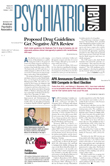As biomedical research on psychopharmacology advances, and time for teaching grows ever more constrained, training residents in psychopharmacology can grow only more difficult— and more vital.
But now a third edition of a model curriculum for teaching psychopharmacology has been made available to psychiatric training programs.
Developed by a committee of the American Society of Clinical Psychopharmacology (ASCP), the Model Psychopharmacology Curriculum for Psychiatric Residency Programs, Training Directors, and Teachers includes more than 50 lectures in PowerPoint format, along with hard copies of all of the slides. The curriculum includes basic courses designed for PGY-1 and -2, and an advanced course for PGY-3 and -4.
Eight lectures for child and adolescent psychiatry and five for geriatric psychopharmacology are also included. And new to the third edition are pre- and post-test questions for most of the lectures to test competency.
Also new to this edition are annotated recommendations for outstanding texts, journals, psychopharmacology Web sites, the use of computers, P450 interactions, algorithms, and other components essential to a 21st-century psychopharmacology training program.
“The curriculum has most of the what, why, and how of teaching psychopharmacology, as well as ways to evaluate residents' learning,” said Ira Glick, M.D., chair of the Curriculum Committee for the ASCP.“ We have something unique. Training directors have told us that this is the most complete curriculum developed in any area of psychiatry. It makes no sense for programs not to get this—why invent the wheel when you have everything up to date that you need?”
He said that as psychopharmacology advances and the evidence base for its efficacy expands, proficiency is increasingly vital for the psychiatrist of tomorrow.
“The stakes are high,” Glick told Psychiatric News.“ If you were having your lungs operated on, you would want to know the surgeon operating is competent. In the same way, we would want psychiatrist to be competent in psychopharmacology.”
He is a professor of psychiatry and behavioral science at Stanford University School of Medicine.
The impetus for a model curriculum began in the mid-1980s with the American College of Neuropsychopharmacology. A curriculum was developed through that organization but was not widely marketed, Glick said.
In the 1990s, the project was taken up by the ASCP under a committee chaired by Glick. Today, the curriculum is used by some 50 residency programs.
Now ASCP has entered into an alliance with the American Association of Directors of Psychiatric Residency Training to expand the module, making it more portable for different programs and adding a neuroscience component.
In time, Glick said, the curriculum will be disseminated to every training program in the country. Until then, the status of training in psychopharmacology around the country is highly variable.
“Large institutions with lots of psychopharmacology faculty do pretty well,” Glick said. “The smaller programs have a lot of trouble covering everything they need to teach. With multiple pressures on teachers making it difficult to even find time to teach, the adequacy of training in psychopharmacology in some places leaves something to be desired.”
Glick said similar modules have been churned out by pharmaceutical companies and other organizations only to be ignored by training programs. But the new psychopharmacology curriculum was developed with broad input from educators around the country, giving them “ownership” of the module. “Unless they show some interest in the product, we know they won't use it,” he said. “You have to bring people on board in the development of an instrument.”
Glick has insisted that the curriculum have a price, with all of the money collected going toward updating the curriculum. “We have learned that if you just hand people teaching materials, they tend to just throw them away,” he said. “People have to value what you are giving them.”
The curriculum is available for $500 (plus $40 for domestic shipping or $85 U.S. dollars for international shipping) from ASCP at P.O. Box 40395, Glen Oaks, N.Y. 11004-0395. Programs that have purchased earlier editions of the curriculum can purchase the third edition for $400. More information is available by calling (718) 470-4007. ▪
